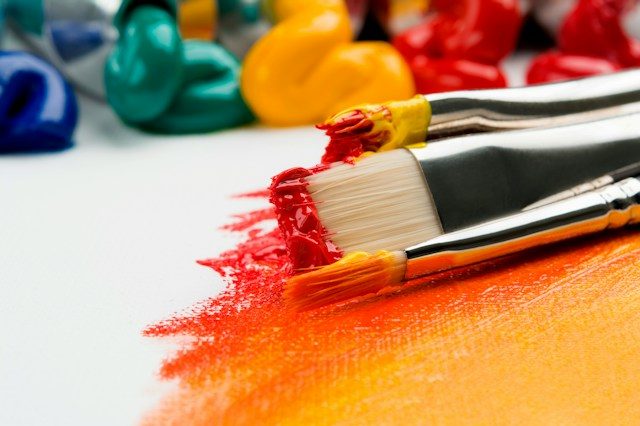Things I’m learning from doing art
Have you ever encountered a big picture idea or life lesson, and it feels new and fresh, and at the same time like a good reminder of something that you already knew? Since I’ve started doing art again, I feel like I’ve had several of these experiences.
Now that I’m in a very different place in my life–much more unmasked, authentic, and in a healthier headspace–these lessons are impacting me in different ways than they have before. I’m not sure that I can express them adequately in words, but I will try.
Btw, this will probably turn into an extended, loosely connected, series of articles. Here’s the first, on some of my current thoughts around making mistakes.
Sometimes mistakes can be fixed
Sometimes when I’m drawing, I make a line that’s a little bit off from where I wanted it to go, or I accidentally tap the paint somewhere I didn’t intend, or I try something and immediately dislike it.
I’ve been painting/drawing with oil pastels (they’re kind of a hybrid of both), and sometimes I can remove some or all of the pigment, and sometimes I can color over it so that, although it can’t be seen, no one would ever know that what they see wasn’t what I intended. The mark happened, but it doesn’t negatively impact anything else.
The mark happened, but it doesn’t negatively impact anything else.
Sometimes in life, too, I can do something and immediately dislike the outcome. Or it produces an outcome I didn’t expect or intend, and it wrenches my gut. I’ll feel regret, dissatisfaction, or disappointment about what happened, or anxiety about what might come of it.
Sometimes it’s not so intense, and I might feel neutral curiosity, or even wonder, in a sort of, “well, that was unexpected” way. (And sometimes it’s a positive unexpected outcome, but that’s a different life lesson.)
When mistakes like this happen, sometimes I’m able to do something about it, so that it doesn’t have a long term effect, like scraping away the paint or painting over the unwanted mark.
When actions have echos
There’s a fantasy book series I love by Leigh Bardugo, and in “Crooked Kingdom,” a character explains that her people don’t have a word for “sorry.” Instead, when they want to make amends, they do what they can to fix the thing that they did in such a way that it doesn’t continue to have a negative impact, and then they say to the person they hurt, “this action will have no echo.” I love that.
then they say to the person they hurt, “this action will have no echo.”
Because when things go wrong, I find it so easy to get stuck on having done something wrong. On having made a mistake. Even when it can be fixed, even after it has been fixed, I have sometimes fixated for years on having made a (small, big, any) mistake. But that fixation is itself an echo.
If I hold myself back from doing other things in fear of making mistakes, that is a long-term impact, even after I’ve fixed the original mistake, or after my life has changed enough that it doesn’t matter anymore.
Not being perfect
In the last several years, I’ve been learning to forgive myself for not being perfect. For not having known and accounted for everything that would happen before the fact. I’ve been learning to try things out and be willing to accept that I don’t know every possible outcome, and trust myself enough to know that I can deal with the consequences.
In the last several years, I’ve been learning to forgive myself for not being perfect.
Often, the consequences feel like they’re too huge to handle, and that feeling has paralyzed me. But part of my anti-anxiety work has been reminding myself that I’m rarely dealing with genuine life and death issues. The consequences may have major impacts that may cost a lot in money or time or effort or hardship, yet I’ve dealt with those in the past, and I can deal with them better now than I ever have before.
Making a mistake is not evidence that I’ve failed at being a person, or a painter, or a good friend, or a responsible adult, or whatever the case may be. It is evidence that I have lived and tried things.
Trying new things
If I hold myself to the standard that everything I do has to turn out right (and I did for years; it was miserable), I will never do the things I want most. I’ll pick the safer paths. The boring paths. The socially acceptable normative paths.
When I started accepting that I didn’t have to be perfect, and that I might make mistakes along the way, and that I can deal with whatever comes from them, it freed me to start exploring who I genuinely am, and what I really want in life, and to make those things happen. It’s gotten me to where I am today, and I’m continuing to explore more and more.
When I started accepting that I didn’t have to be perfect, and that I might make mistakes along the way, and that I can deal with whatever comes from them, it freed me to start exploring who I genuinely am, and what I really want in life, and to make those things happen.
Each time I scrape away some paint, or cover up a line, it’s like I’m scraping away a tiny bit of the internal resistance to trying things without guaranteed results. Maybe I won’t like what I get, but I can often do something to change some part of those results.
Even when I don’t like the entire painting, I can make another. The fact that I made one (or many) painting(s) I don’t like doesn’t have to be a blotch on my permanent record.
Last thoughts (for now)
Some mistakes don’t affect other things, some can be repaired so that they don’t echo into the future, and some can be rendered un-noticeable.
Sometimes, however, mistakes can’t be fixed.
There are times when I can’t completely get rid of the marks they leave (short of scraping away the paper underneath, which is itself a remnant effect, even if it isn’t visible), and times when trying to fix it actually makes things worse.
That’s what I’ll be exploring in the next installment of this series.




